






BIDFF '20
BUCHAREST INTERNATIONAL DANCE FILM FESTIVAL, THE 6TH EDITION
SEPT 3–6, 2020
BIDFF '20
BUCHAREST INTERNATIONAL DANCE FILM FESTIVAL, THE 6TH EDITION
SEPT 3–6, 2020
BIDFF 2020 AWARDS
The jury formed from Chrysanthi Badeka (GR), Farid Fairuz (RO) and Patrice Nezan (FR) named NAVIGATION (directed by Marlene Millar, choreography by Sandy Silva) the Best Film, and CALL OF PINK (directed by Denisa Anastasiu, Maria-Luiza Dimulescu and Catalin Rugina, choreography by Denisa Anastasiu and Maria-Luiza Dimulescu) the Best Romanian Film. Two Special Mentions were also awarded: to DIVIDED WE SCROLL (directed by Klass Diersmann, choreography by Pepa Ubera) from the International Competition, and to inHABITED_ The Attic (directed by Smaranda Gabudeanu, choreography by Smaranda Gabudeanu and Svitlana Pashko) from the Romanian Competition. The jury chose not to award the Best Musical this year. Instead, they gave a Special Jury Award to CANNING TOWN (directed and choreographed by Fabiola Santana and Will Dickie).
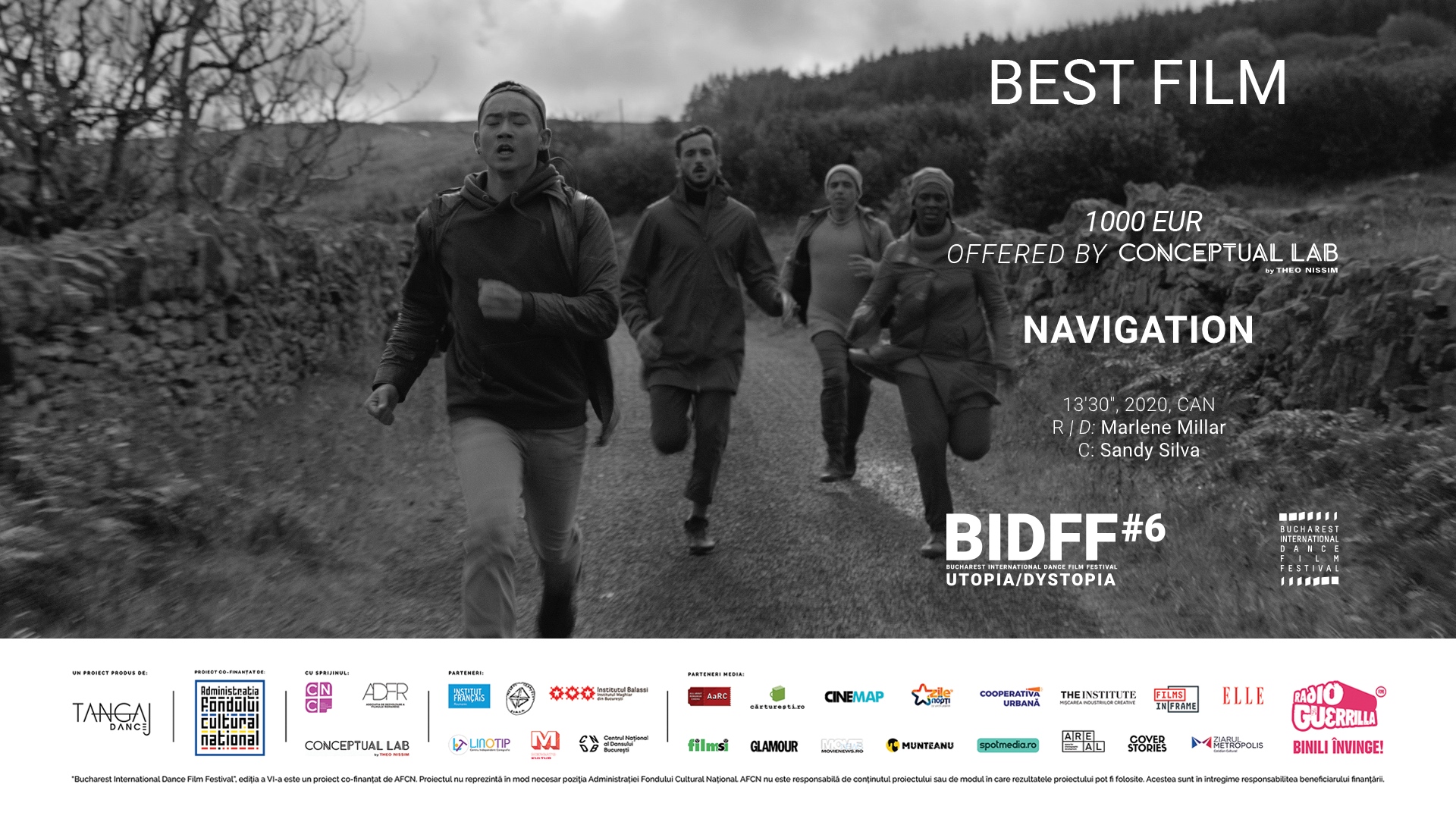
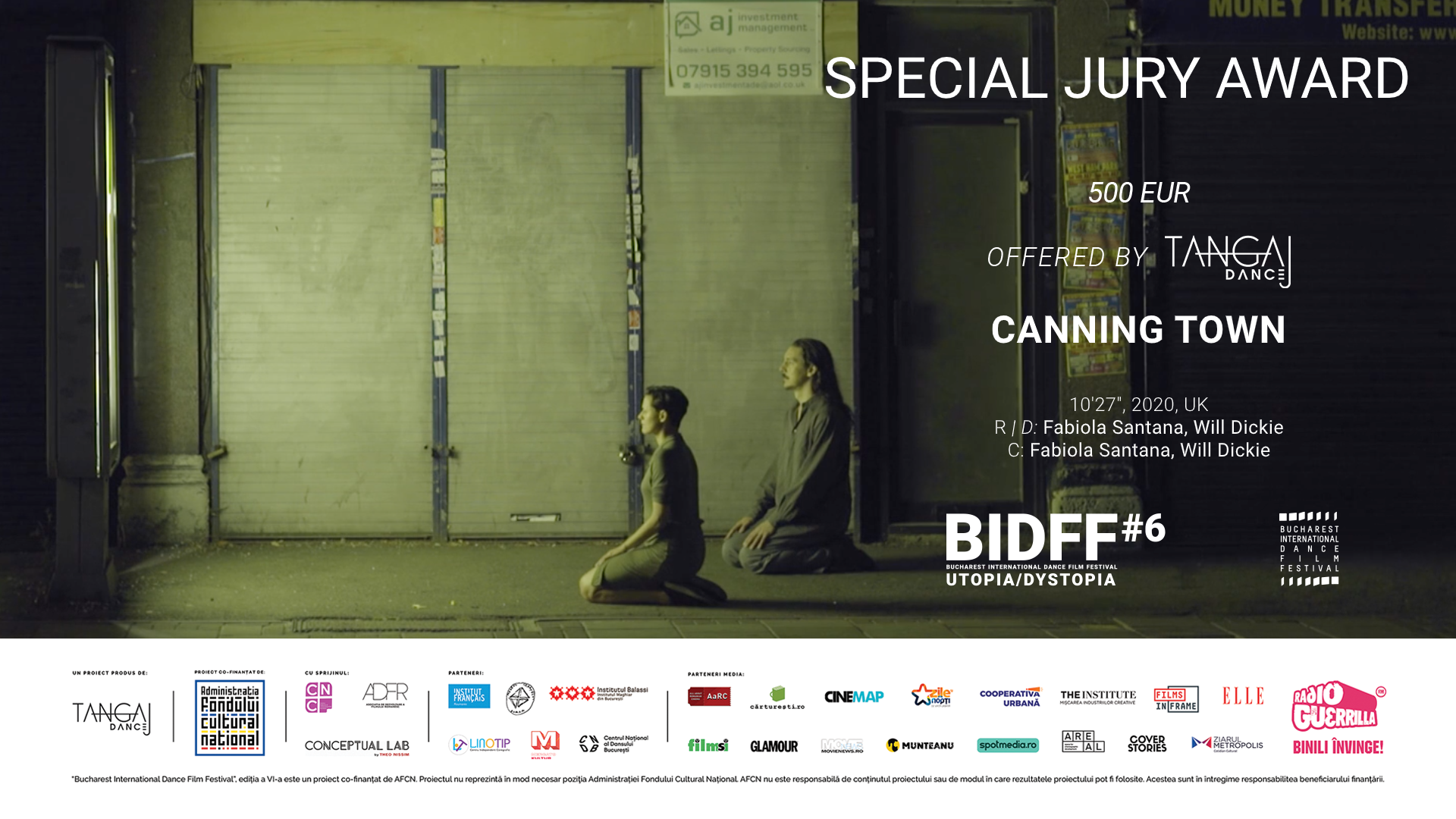
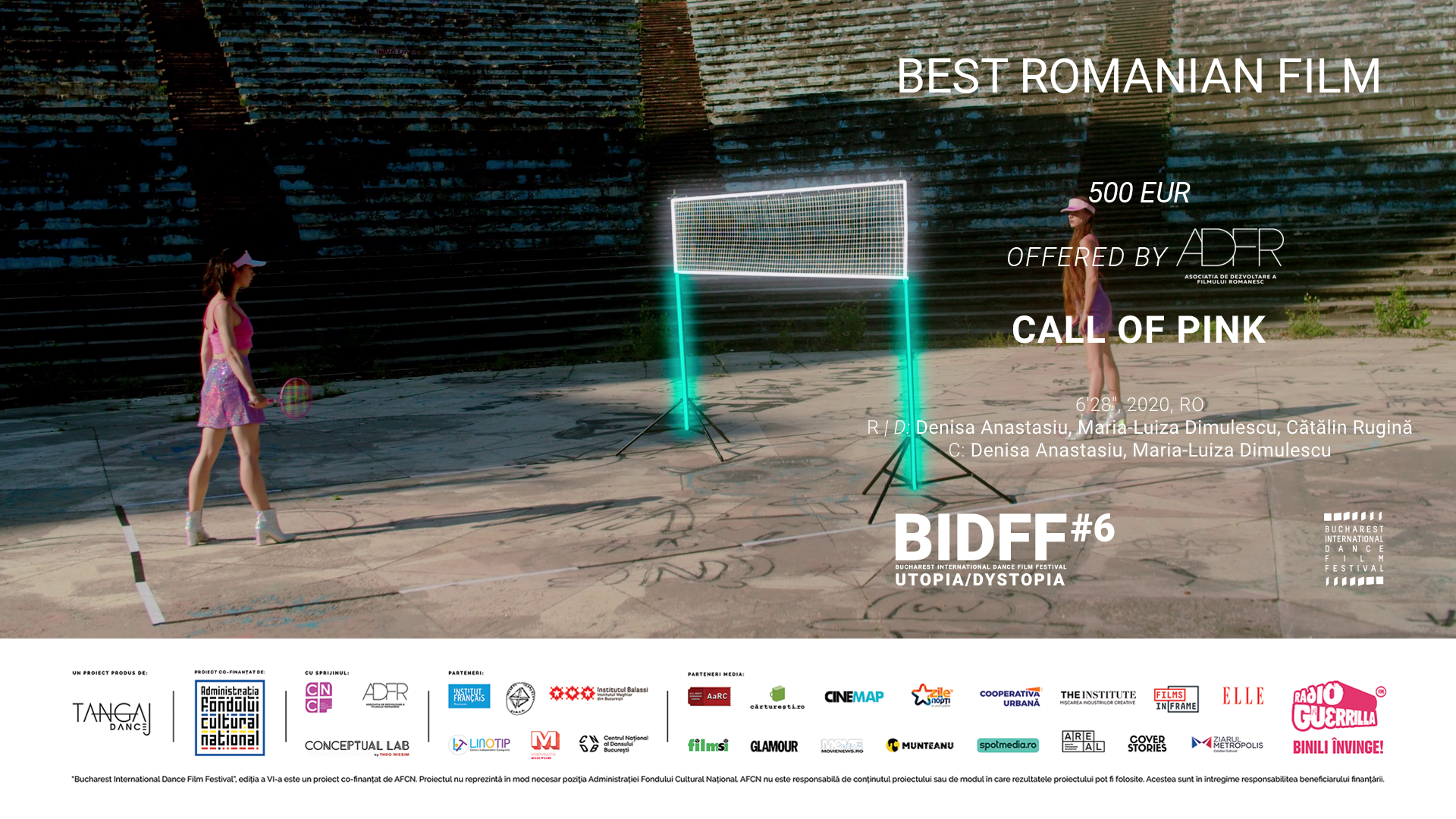
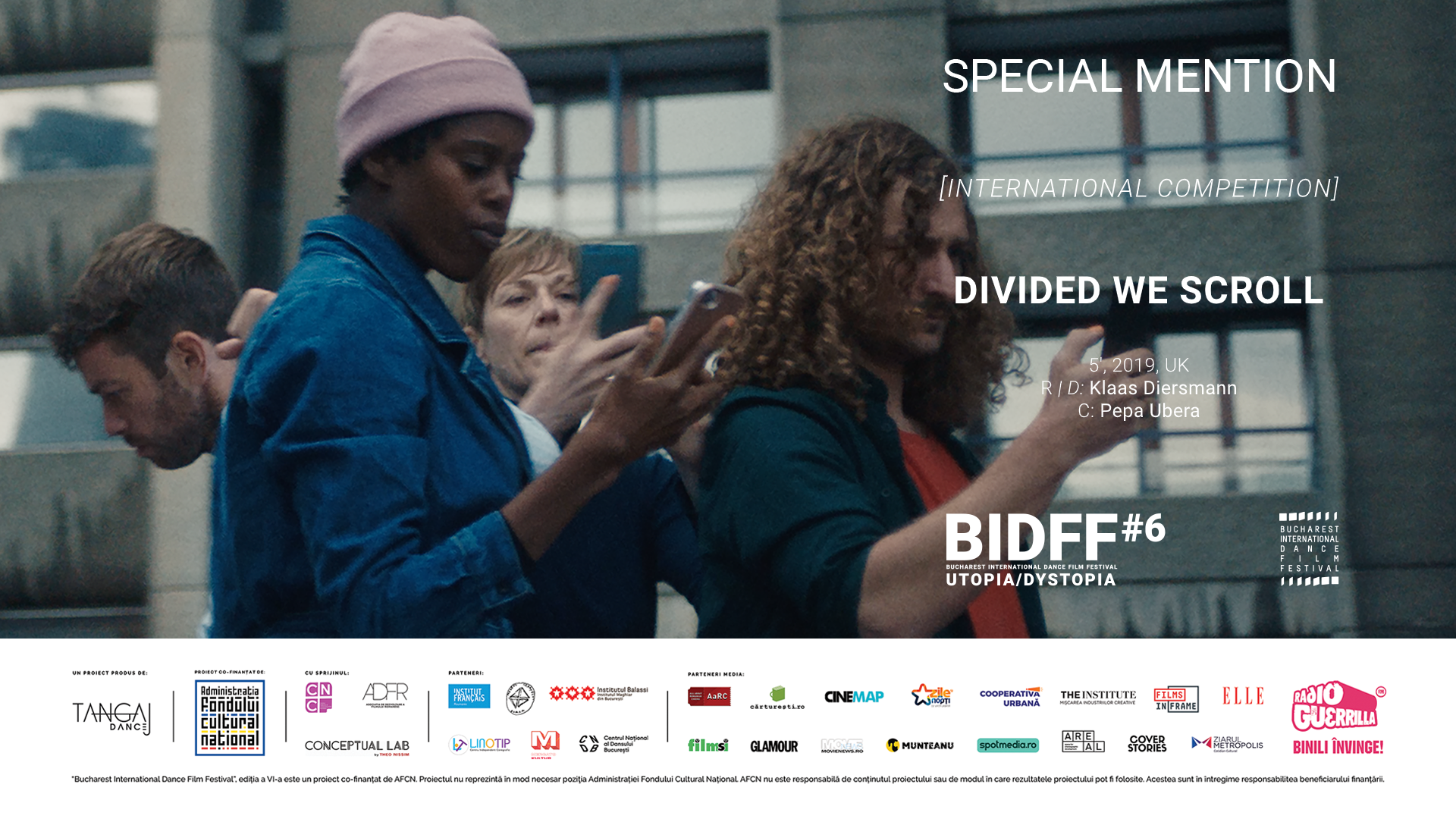
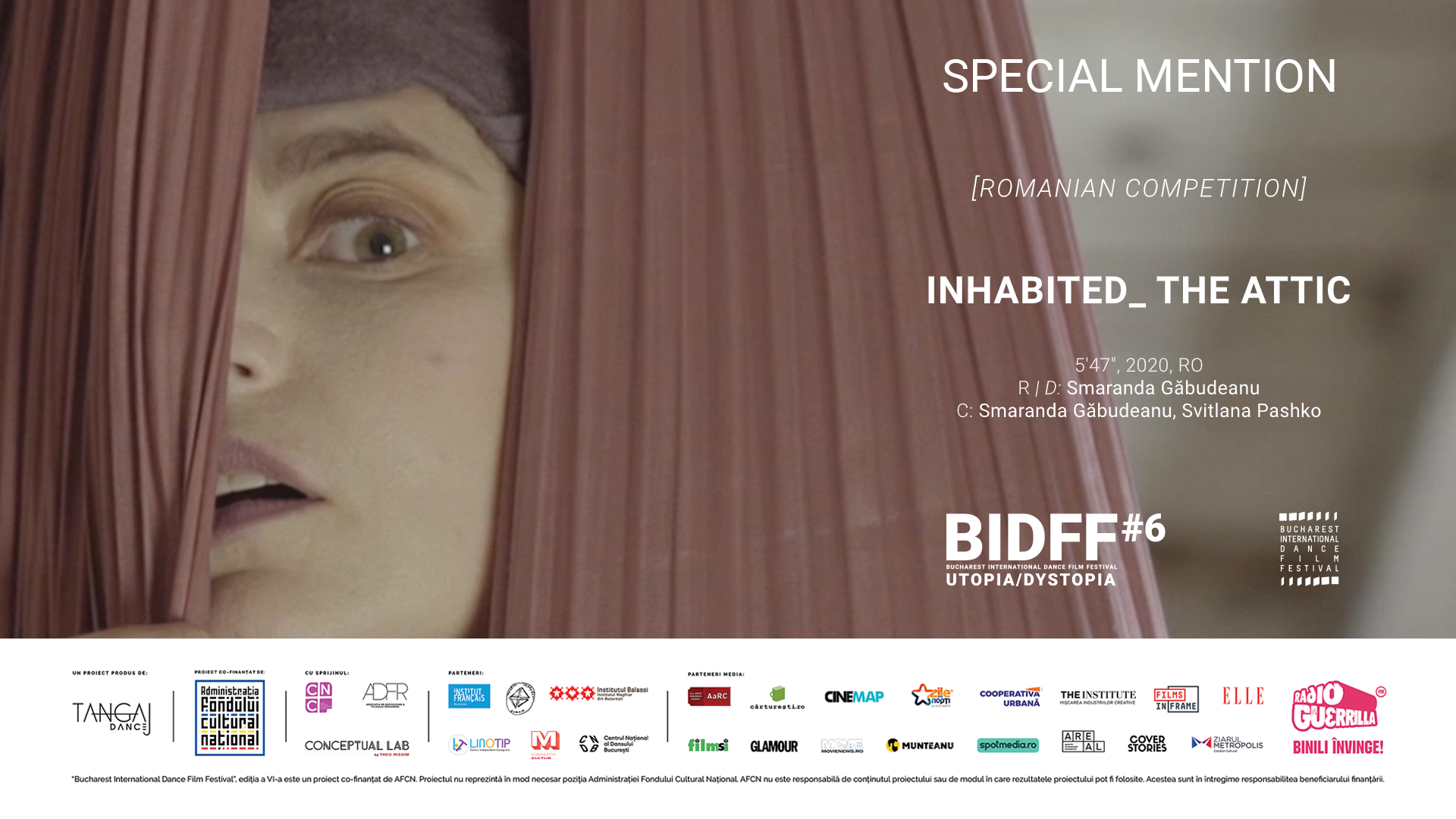
artistic direction and theme of the festival: UTOPia/Dystopia
“Little did we know, in 2019, when we first started to work towards the sixth edition of Bucharest International Dance Film Festival, that the theme of the festival will be of such actuality and precision in 2020.
The context of the global pandemic we are facing rises relevant questions around the present and the future. Our relational patterns are provoked, as the physical contact, and the proximity to the others are limited and restricted. Performance venues and cinemas are closed for a while, and our activity has been moved almost entirely online. In these circumstances, we feel the connection between the body, the dance, and the camera has become more useful and relevant than ever.
In 2020, BIDFF turns towards the future and tries to visualize it through the lens of utopia|dystopia. Both are concepts used in Western culture, referring to better or fallen worlds, worlds possible in or through imagination. They are always future-oriented, but still unrealized or unrealisable. To some extent, we could say that the utopian|dystopian impulse is implicit in any art form if we admit that, as Adorno was trying to demonstrate, the function of art is to try to change the world. And from here arises a question to which contemporary artists - be they creators, critics, theorists or curators - try to answer: if art exists to transform the world, does it mean that all art is utopian|dystopian?
We understand these two concepts as critical or creative strategies of reflecting upon the world, instruments for shaping, transforming, revolutionising it. In the same manner, we consider utopia and dystopia as exceptionally offering topics, not only in terms of formal possibilities but also in terms of conceptual perspectives upon the future, as they open limitless possibilities.
We encourage daring artistic discourses and radical positions. We imagine that the dance films and the events programmed within the festival will fall in line with a wide range of artistic experiments, that are not only genre ground-breaking but also offer new ways of envisioning possible/probable directions of our future.
We also address a challenge to the audience: to understand the dance film as an open system, an art of process and progress. This year, BIDFF continues to develop its program, by adding new special screenings, lectures and workshops that explore, on a theoretical and practical level, the topics of utopia and dystopia through fiction, expanded cinema, animations, musicals and documentaries.”

Schedule
Schedule
+ Thursday, SEPTEMBER 3RD
20:30 – 22:30 / 21:00 – 23:00 | Opening Film: Parallel screenings of Ema, by Pablo Larraín 113'
+ Friday, SEPTEMBER 4TH
11:00 – 15:00 | Dance Film Workshop with Chrysanthi Badeka
16:00 – 18:00 | Masterclass Maria Tanjala: See the Big Picture – Collaborate and Innovate
20:30 – 21:45 | Fictions & Frictions – International Competition 1 75'
22:30 – 23:30 | Treats & Traps – Musicals Competition 56'
+ SATURDAY, SEPTEMBER 5TH
11:00 – 15:00 | Dance Film Workshop with Chrysanthi Badeka
16:00 – 18:00 | Lecture Jassem Hindi: Haunting and Hospitality, a Double Bind (utopia, dystopia and time).
20:30 – 21:30 | Dances & Circumstances – International Competition 2 58'
21:00 – 22:30 | Being Jérôme Bel, by Sima Khatami and Aldo Lee 79'
22:00 – 23:00 | Mazes & Gazes – Romanian Competition 58'
+ SUNDAY, SEPTEMBER 6TH
11:00 – 15:00 | Dance Film Workshop with Chrysanthi Badeka
16:00 – 18:00 | a dance by pavleheidler: an embodied approach to utopia and other short stories
20:30 – 22:00 | Closing Film: The Euphoria of Being, by Réka Szabó 84'
21:00 – 22:30 | Awards Ceremony & Bodies & Fluidities – International Competition 3 75'
Detailed schedule
*Open-Air Screening
Tickets here!
Ema
– Opening Film
Sept 3rd, 20:30 — 22:30 @Mercato Kultur
& 21:00 — 23:00 @Cinéma Elvire Popesco
Pablo Larraín returns with the dazzling Ema, an intoxicating comment on sex, power and chaos in modern-day Chile. Driven by an electrifying original score by Nicolas Jaar and a reggaeton tracklist plucked straight from the streets of Valparaíso, Larraín’s latest is thrillingly defiant and palpably fresh. Ema is a young dancer in a reggaeton troupe: effortlessly magnetic and dangerously impulsive. Her toxic marriage to older choreographer Gastón (Gael García Bernal) is beyond repair, following a rash decision to hand their adopted child Polo back into the hands of the state. Racked with regret, she sets out on a mission to get her son back, not caring who she’ll need to fight, seduce or destroy to make it happen.
The film, included in the official competition of last year’s Venice Film Festival, questions the concept of family and the efforts undergone by those who fall in love.
#INDUSTRY
*Free entry based on registration and selection
DANCE FILM WORKSHOP
— with Chrysanthi Badeka
Sept 4th — 6th, 11:00 — 15:00 @LINOTIP — INDEPENDENT CHOREOGRAPHIC CENTER
In a world where we are confronting every day profound critical challenges, it is essential to reconsider more than ever what is the power of the body on screen. At a time of social transformations, how do we move the audience with our work? How do we frame the stories of a moving body? How do we envision the future of dances on screen? During the workshop we will explore dance film making as a practice for interdisciplinary artistic development. By using transmedia ways of reflection and composition, we will work altogether and in small groups exploring content, aesthetics, choreography for the camera, non-theatrical shooting, storyboarding, writing and teamwork communication. The workshop aims to create fruitful fermentations between professionals from different artistic disciplines, focusing on new dance film utopias and peer-to-peer education.
#INDUSTRY
*Free entry based on registration
SEE THE BIG PICTURE — COLLABORATE AND INNOVATE
– MASTERCLASS MARIA TANJALA
SEPT 4TH, 16:00 — 18:00
@CNDB — THE NATIONAL CENTER FOR DANCE BUCHAREST
The two-hour session will explore the overarching vision of filmmaking and the importance of collaborative work. As filmmakers have to wear many hats these days, it's important to know your tools and opportunities from script development to production, marketing, audience engagement and to build your personal brand. While engaging with sales agents, festivals and distributors is a great part of the journey, keeping a tidy production with IP contracts, investors, and reports is equally important. Be it a short, a doc or a feature-length film, the principles of discipline, collaboration and finding your audience stay the same. It's the golden age for content creators!
*Open-Air Screening
Tickets here!
Fictions & Frictions
– International Competition I
Sept 4th, 20:30 – 21:45
@CINÉMA ELVIRE POPESCO
A space can sometimes create the illusion of security and belonging- to a group, a community or a territory. When the borders of this space become uncertain, we are forced to step out of the comfort of what we know and readapt. We are opening the competitional category of the Bucharest International Dance Film Festival with a selection of short films that portray people in search of the right place - be it mental, emotional or physical. Whether they meet in real places or travel to virtual territories, the protagonists of this journey oscillate jovially between fiction and materiality.
Line-up: Navigation, Cinderella Games, Salt Water, Re:Born, Close Quarters, between silences, Divided We Scroll, The Last Children, and No, I Dont Want to Dance!
*Open-Air Screening
Tickets here!
Treats & Traps
– Musical Competition
Sept 4th, 22:30 – 23:30
@CINÉMA ELVIRE POPESCO
A dining room transformed into an opportunity for virtuosity in movement- colorful sweets that trigger internal conflicts, a cafe that becomes a pretext for interaction, visions of colorful vegetables that sing and dance. This year's musical competition centres around full tables. The four short films humorously use food as a pretext for starting a conversation about the negative attitudes we have towards our bodies, the social anxiety we sometimes battle with, and the unjustified way in which we let ourselves be guided by appearances.
Line-up: Sweet but Deadly, Eat Me!, Opening Night, and Tremble.
#INDUSTRY
*Free participation based on registration
HAUNTING AND HOSPITALITY,
A DOUBLE BIND
(utopia, dystopia and time).
– Lecture Jassem Hindi
Sept 5th, 16:00 — 18:00
Online, on Zoom
Time-based arts (performance, poetry, sound, cinema...) and their relatives have discreetly developed myriads of time theories, as side effects of their work, by borrowing time-shaping gestures from each other: overexposure, cut-up, rewind, field depth, swarm, voice over... These editing techniques have a side effect: not only do they manipulate time, but they are the very texture of u/distopias: exposing what exists, what can be hosted, what can haunt us, and what are the laws of transformation. Time reassembles itself within us in fragments, shards made out of living bodies, colouring our relation to the real.
*Open-Air Screening
Tickets here!
Dances & Circumstances
– International Competition II
Sept 5th, 20:30 – 21:30
@PEASANT MUSEUM CINEMA
Four short films from Hong Kong, France, Israel and the USA that speak firmly and critically about dance as a necessity, dance as a lifestyle. These four films explore different approaches for understanding, practicing and using dance: to remember, to transcend cultures and languages, to survive. For the first time, the official BIDFF competition presents an exquisite selection of shorts in which dance is documented as a transformative human process.
Line-up: Someday I Will Become a Rock, Turf Nation, The Golden Age, and Rimona.
*Open-Air Screening
Tickets here!
BEING JÉRÔME BEL
Sept 5th, 21:00 — 22:30
@CINÉMA ELVIRE POPESCO
Making a film about the choreographer Jérôme Bel means embarking on a paradoxical project: how do you direct the anti-director? There’s a risk of seeing your film turn against itself. In the attempt to present Jérôme Bel’s working process, a choreographer known for his provocative manner of confronting the spectators with their own misconceptions about body and performance, the two directors find themselves facing Bel’s resistance of being portrayed.
The film premiered last year at the Locarno Film Festival. In 2020 BIDFF presents the Romanian premiere of Being Jérôme Bel.
*Open-Air Screening
Tickets here!
Mazes & Gazes
– Romanian Competition
Sept 5th, 22:00 – 23:00
@PEASANT MUSEUM CINEMA
This year's Romanian Short Film Competition brings a selection of films that render into perspective the body and the (non)movement, touch and human interaction, and the notion of reality, in the way that it is commonly perceived. The seven short films offer, in an eclectic and detached manner, a new approach on these topics.
Line-up: OPIA, Call of Pink, SUNLESS, Études from an inner garden (Ciorne de gradina), Memory of a Kneaded Touch, Ausum, and inHABITED_ The Attic.
#INDUSTRY
*Free participation based on registration
an embodied approach to utopia and other short stories
— a dance by pavleheidler SEPT 6th, 16:00 — 18:00
ONLINE, on Zoom
Much of my thinking these days is engaged in the attempt to explain to myself the extent of the influence Descartes and his work on what is popularly referred to as the theory of the mind-body split had on the way in which standards of value become defined and successfully upheld in the context of the neoliberal and colonising, culturally white west. In this talk that I was invited to give, I will try my best to present evidence of the way the theory of the mind-body split is integrated in the white western cultural canon by portraying the way the theory manifests in practice, in the assumptions that cultural white westerners traditionally make, for example, and/or in the way in which cultural white westerners traditionally jump to conclusions. In other words, I will be attempting to tell the story of how I think a theory that discriminates against the body became not just embodied (!) but embodied as a dominant global culture whose practices are competitive, anxious, self-centred, object-oriented and obsessed with power. This is the story of dystopia, one we’re all – I’m sure – already intimately acquainted with.
*Open-Air Screening
Tickets here!
THE EUPHORIA OF BEING
– CLOSING FILM
SEPT 6TH, 20:30 — 22:00
@PEASANT MUSEUM CINEMA
Éva Fahidi was 20 years old when she returned to Hungary from Auschwitz Birkenau. She was all alone, 49 members of her family were murdered, including her mother, her father and her little sister. 70 years later, aged 90, Éva is asked to participate in a dance-theatre performance about her life. Réka, the director imagines a duet between Éva and the young, internationally acclaimed dancer, Emese. Réka wants to see these two women, young and old, interact on stage, to see how their bodies and their stories can intertwine. Three women – three months – a story of crossing boundaries. Whilst key moments of Éva’s life are distilled into theater scenes, a powerful relationship forms between the three women.
The film won Critics’ Week Award at Locarno Film Festival and Human Rights Award at Sarajevo Film Festival among several other international prizes.
*Open-Air Screening
Tickets here!
Bodies & Fluidities
– International Competition III
And Awards ceremony
Sept 6th, 21:00 – 22:30
@CINÉMA ELVIRE POPESCO
When does dance become one of the means of resistance? When does it transform into a meditation on the effects that time has on our bodies? How do we humorously treat a subject as controversial as objectifying a woman's body? What is the relationship between power and intimacy? The eight short films, from the last BIDFF evening, present dance and the body as either unstable or unifying ways.
Line-up: The Embrace of the Valkyries, The Gods of Tiny Things, Canning Town, ESCAPE, Correspondance (Contact), Men, Lazarus, and SHE/I.

Jury
AND THE FESTIVAL TEAM
Jury
AND THE FESTIVAL TEAM
The jury will watch the films included in this year’s competitions and will award awards for the Best Film to a film chosen from the International Competition (1000 EUR, offered by Conceptual Lab by Theo Nissim), the Best Romanian Film (500 EUR, offered by ADFR — Asociatia de Dezvoltare a Filmului Romanesc), and the Best Musical (500 EUR, offered by Asociatia Tangaj Dance).
Chrysanthi Badeka (gr)
Chrysanthi Badeka is a freelance choreographer, dancer, filmmaker, editor, videodance trainer and Project Manager of mAPs – migrating Artists Project in Greece. After her B.A. in dance, she pursued her M.F.A. at Tisch School of the Arts in New York University, focusing on choreography for the camera, with scholarships from State Scholarship Foundation and NYU. Returning to Greece, for 10 consecutive years she dedicated herself to the promotion and development of the art of videodance, co-directing Athens Video Dance Project - International Dance Film Festival (2010-2020).
She is co-founder of The Mediterranean Screendance Network and MØZ PRODUCTIONS, while she has been jury member for the DAN.CIN.FEST (France) and International Contest La Danza in 1 minuto / COORPY (Italy). Alongside she has curated dance films for many conferences and other festivals such as: L'ALTERNATIVA FILM FESTIVAL (Spain), OFF EUROPA (Germany), SCREENDANCE: PRACTICE & THEORY / University of IUAV (Italy), LOIKKA FESTIVAL (Finland), FESTIVAL DE VIDEDANZA DE PALMA, TANZRAUSCHEN International Dance on Screen Festival (Germany) and many local dance festivals in Greece. As choreographer she has obtained grants for her works from the Greek Ministry of Culture, NEON foundation and Compagnia di San Paolo / "ORA! Produzioni di cultura contemporanea.
For more information about her work, please visit her website.
Farid Fairuz (ro)
Mihai Mihalcea graduated Choreography High School and UNATC, Choreography Department, Bucharest. In the 90s he was dancing for Komische Oper Berlin and collaborating with Christian Trouillas Company in Paris. Until he reinvented himself as Farid Firuz, following a performative project of fictionalizing his own biography, Mihai Mihalcea had an essential role in several initiatives that lead to the international recognition of Romanian contemporary dance and the founding of several structures and institutions that became milestones of the scene: Marginalii Group, Inter/National Center for Contemporary Dance, Multi Art Dans Center and The National centre for Dance in Bucharest (CNDB), acting as the director of the last institution between 2006-2013.
For his activity within CNDB he was nominated for Paris – Europe 2006 prize by the Maison d'Europe et d'Orient Paris. In 2013 - 2014 he received a Berlin Arts Academy fellowship. In 2014 he co-curated Good Guys Only Win in Movies Festival at Hebbel am Ufer Berlin. He performed and created several works that were presented in Europe and USA. MM/FF initiated Solitude Project Association, with which he developed several projects: IndepenDans, subRahova and Caminul Cultural (together with Manuel Pelmus and Brynjar Bandlien). In the last years he collaborated and frequently performed in the works of Alexandra Pirici. In 2019 he resumed his collaboration with CNDB as head of Programs and Projects Department.
For more information about his work, please visit his website.
Patrice Nezan (fr)
Patrice Nezan has been active as a producer for the last fifteen years. His starting point was to build bridges between film directors and contemporary artists from the dance, music, visual art worlds. He believed – and still does – that confronting these different artistic grammars, would nourish creative and innovative film proposals, with the willingness of researching what’s beyond the words. This editorial line allowed him to collaborate with numerous filmmakers and artists from all over the world. With this background, he progressively moved to features in fiction, animation & documentary that have been selected in international festivals such as Cannes, Venice, Toronto, Locarno, Annecy and Visions du Réel; his latest effort, Corpus Christi, was nominated for an Oscar in the Best International Feature category. He was nominated for the French TV producer prize of the PROCIREP (French producers society) in 2008 and 2011.
He is a member of Unifrance, European Film Academy and of the Académie des Césars, amongst others. Jury at FID MARSEILLE in 2007 and at the VALENCE Scriptwriters Festival in 2014 and 2018, he has also been, since 2009, an expert regarding the European program MEDIA development, speaker at the National School of Photography in ARLES, at the animation film school La Poudrière in VALENCE, at Grenoble-Alpes University, at Sciences Pô GRENOBLE, transmedia specialty and at ENS Louis Lumière. He was a member of the board of directors in 2013/2014 for the audiovisual competitivity program PRIMI in Provence-Alpes-Côte d’Azur and then for LUX-VALENCE from 2015 to 2018, a national theatre dedicated to visual and performing arts.
Festival Team
Co-Founder & Artistic Director Simona DEACONESCU | Co-Founder & Festival Director Anamaria ANTOCI | Curator Andreea NOVAC | Programmers Simona DEACONESCU Andreea NOVAC Laurentiu PARASCHIV Catalin OLARU Anamaria ANTOCI | Organising Team Laurentiu PARASCHIV Anamaria GEGER | Communication Simona RADOI Anca MACOVICIUC Dona TESCOVSCHI | Visual Identity Ioana TRUSCA | Video Editor Alex PINTICA | Financial Coordinator Monica ISTRATE | Accountant & Fiscal Adviser Florina BAICU | Translations Ligia SOARE | Subtitles Andrei HARABAGIU

VENUES
VENUES
Cinéma Elvire Popesco
DACIA BLVD. 77
PeasAnt Museum Cinema
MonetAriei ST. 3
the National Centre for dance Bucharest
MARASESTI blvd. 80-82
LINOTIP – INDEPENDENT CHOREOGRAPHIC CENTER
Ion Brezoianu st. 23-25
mErcato kultur
Gheorghe Demetriade st. 6-10

PARTNERS
CO-FOUNDERS, SPONSORS, PARTNERS
PARTNERS
CO-FOUNDERS, SPONSORS, PARTNERS
The 6th edition of Bucharest International Dance Film Festival is a cultural project organized by the Tangaj Dance Association and co-financed by the Administration of the National Cultural Fund. The project does not necessarily represent the position of the Administration of the National Cultural Fund. AFCN is not responsible for the content of the project or how the project results can be used. These are entirely the responsibility of the beneficiary of the funding.
The festival is supported by Romanian Film Centre, Conceptual Lab by Theo Nissim, ADFR - Association for the Development of Romanian Film. The partners of the festival are the French Institute (Cinema Elvire Popesco), the National Museum of the Romanian Peasant (Cinema Museum of the Romanian Peasant), the National Center for Dance Bucharest, LINOTIP - Independent Choreographic Center, Balassi Institute, Mercato Kultur.
Seen by Radio Guerrilla
Media partners: AaRC.ro, AREAL, Carturesti, Cinemap, COOPerativa Urbana, Cover Stories, Elle, Films in Frame, FilmSi, Glamour, Movienews, Munteanu Recomanda, Spotmedia, The Institute, Ziarul Metropolis, Zile si Nopti.

ABOUT
BUCHAREST INTERNATIONAL DANCE FILM FESTIVAL
ABOUT
BUCHAREST INTERNATIONAL DANCE FILM FESTIVAL
IT ALL STARTED IN…
2015, when choreographer Simona Deaconescu and film producer Anamaria Antoci gathered resources to develop the only festival in Romania dedicated to dance films.
BIDFF was founded out of love for the dance film genre, with the scope of promoting artists that work across genres and presenting cinematographic works in which the language of the body explores strong narratives. Each year, the festival has a different theme that reflects upon the contemporary realities and questions the future of the body.
The programme of the festival consists of film screenings, visual art exhibitions and installations, performances, concerts, lectures, workshops and masterclasses. BIDFF takes place in the most popular sites in Bucharest, combining art house cinemas, open-air screenings (rooftop or urban gardens), performance venues, galleries and museums. Influential artists join the festival as guests and mentors, while a wide range of scholars, film producers and distributors, both local and international, connect through the BIDFF network of activities.
We aim to connect professionals from arts, through a manifestation in which hybridisation becomes an essential base for innovation. Choreographers as Chris Haring (AT), Sharon Fridman (ES), Florin Fieroiu (RO), meet directors Tomer Heymann (IS), Peter Schneider (USA), meet specialist as Guy Cools (BE), Helena Jonsdottir (IL), Claudia Kappenberg (UK), Andy Wood (UK), meet film producers Ada Solomon (RO), Gullin Ustun (TK), meet visual artists Claudia Hart (USA), Alex Mirutziu (RO), emerging artists meet mid-career artists in a range of activities that involve a discursive approach towards dance filmmaking.
Regionally, BIDFF functions as a meeting point between artistic visions and cultural organisations, promoting a new prototype of collaboration. We want to envision a realistic perspective regarding the means of production of a dance film and present the most active creative hot-spots around the world, doubled by resourceful collaborations between artistic sectors. Since 2017, under the umbrella of BIDFF, we have developed EXPAND. This platform crisscrosses the festival, by supporting cinematographic projects in development and the networking between dance and film industries.
In 2020 BIDFF has been nominated at AFCN AWARDS for “Promoting Romanian Culture around the World”, and in 2016 choreographer Simona Deaconescu received The National Center for Dance Award for “the contribution brought to the Romanian dance scene by organising BIDFF”.
BIDFF is funded through annual applications with the Administration of the National Cultural Fund and the Romanian Cinema Centre. Two editions of BIDFF have been sponsored through ARCUB - The Center for Cultural Projects of Bucharest. Other financial supporters of the festival have been: The Romanian Cultural Institute, Expo Arte Cultural Center and different embassies and consulates in Bucharest (The Austrian Cultural Forum, The Israeli Embassy in Bucharest, Cervantes Institute, Balassi Institute, The Sweden Embassy in Bucharest, The Icelandic Consulate, British Council, The French Institute). BIDFF has received sponsorship from Conceptual Lab by Theo Nissim and in-kind services by Tiriac Auto, Crama Histria, Allira and DHL.
Our main hosts are Cinema Elvira Popescu, The National Center for Dance Bucharest, Gastropub Factory (Rooftop Cinema), The National Peasant Museum Cinema, and LINOTIP - Independent Choreographic Center. Depending on the needs of every edition we have successfully collaborated with CINETIC, The National Museum of Contemporary Art, Galateca Gallery, POINT Theatre, Apollo Theatre, Qreator, The National University of Music, Union Cinema.
BIDFF is produced by TANGAJ COLLECTIVE (Tangaj Dance Association).
Hello WORLD
Hello World is an international project where artists throughout the world have submitted art works to share with all of us. We hope you enjoy this gesture of goodwill and solidarity from our colleagues around the globe. You can read more about it and explore all the art works here.

















